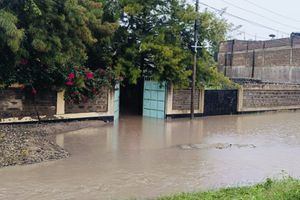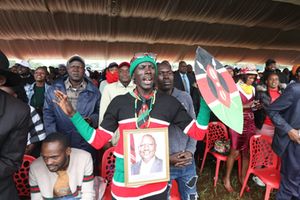Happening Now: Labour Day celebrations at Uhuru Gardens
Kenyans need a visionary leader to deliver them to promised land

Nasa flagbearer Raila Odinga (left) and President Uhuru Kenyatta during political campaigns. PHOTOS | NATION MEDIA GROUP
What you need to know:
- The character and vision of President Uhuru Kenyatta and opposition leader Raila Odinga will be put to test on August 8.
- Kenyans wish to see greater improvement in security, economic performance, jobs, education and governance.
- The President is more of a classical capitalist who believes in private sector-led economic growth, with the benefits being shared and redistributed through projects.
- Mr Odinga agitates for more resources for the poor without a defined strategy on how such should be generated before being reallocated.
The defining moment is finally here. The character and vision of President Uhuru Muigai Kenyatta and opposition leader Raila Amolo Odinga will be put to test on August 8.
The outcome will reflect whether the voters believe more in the promise that President Kenyatta and his Jubilee Party will follow through what the government has achieved in the past four years, or they will be persuaded by the promises by Mr Odinga and the National Super Alliance.
The attributes of a president really matter in defining the strategy and future of a country.
The most important issue for Kenya is how many of the 19.6 million registered voters believe in either President Kenyatta or Mr Odinga as the great leader who will take them to the promised land of milk and honey.
There are many reasons Kenyans are crying for good leadership.
IMPROVEMENT
They wish to see greater improvement in security, economic performance, jobs, education and governance.
They want to be assured of security. They want the feel and taste of an economy that is growing and expanding opportunities for jobs, reducing poverty and promoting equity in the distribution of resources.
Their leader needs to vigorously fight corruption and demonstrate his commitment to the welfare of the majority, especially the poor and disenfranchised.
And considering the history of electoral violence, Kenyans expect a leader committed to peace and unity during and after the elections.
The President is more of a classical capitalist who believes in private sector-led economic growth, with the benefits being shared and redistributed through projects.
Mr Odinga agitates for more resources for the poor without a defined strategy on how such should be generated before being reallocated.
PEOPLE'S EXPECTATIONS
President Kenyatta has had the advantage of demonstrating how much his government has done in the past four years to align his agenda with the people’s expectations.
His government has invested heavily in infrastructure (roads, railways, energy, water and sanitation), improving the enabling environment for business to grow and support jobs and economic growth.
Business prospects remain positive, signalling that the drums of war from political campaigns aren’t being considered a serious threat to the status quo.
Moreover, reforms in education, health care and social protection have improved the basic well-being of the poor and youth.
President Kenyatta promises to transform Kenya from a low middle income to a high middle-income country.
LEGACY
Mr Odinga’s approach is more defined by his composite performance as prime minister under President Mwai Kibaki and his previous sojourns as Roads, Public Works and Housing minister in the first Kibaki government and minister for energy under former President Daniel arap Moi.
His agenda is intertwined with his character as the opposition leader, and his public pronouncements more inclined to destroying President Kenyatta’s legacy than on his development agenda.
It’s not clear why he finds fault in the security and governance institutions—the IEBC, police and military and the anti-corruption agency.
The only institution in his good books is the Auditor-General, which would be lavished with expanded powers in a Nasa government.
Pollsters describe the race as a two-horse contest in which President Kenyatta has maintained a marginal lead over Mr Odinga.
The polls describe the race as “dead heat” or “close to call”, but aren’t bold enough to predict an outright winner, even though there is compelling evidence that the tyranny of numbers favours the President.
Of course, the final tally will depend on a host of factors, including voter turnout and the efficiency of the electoral systems that have been brutally interrogated and dissected.
Mr Warutere is a director of Mashariki Communications Ltd. [email protected]





